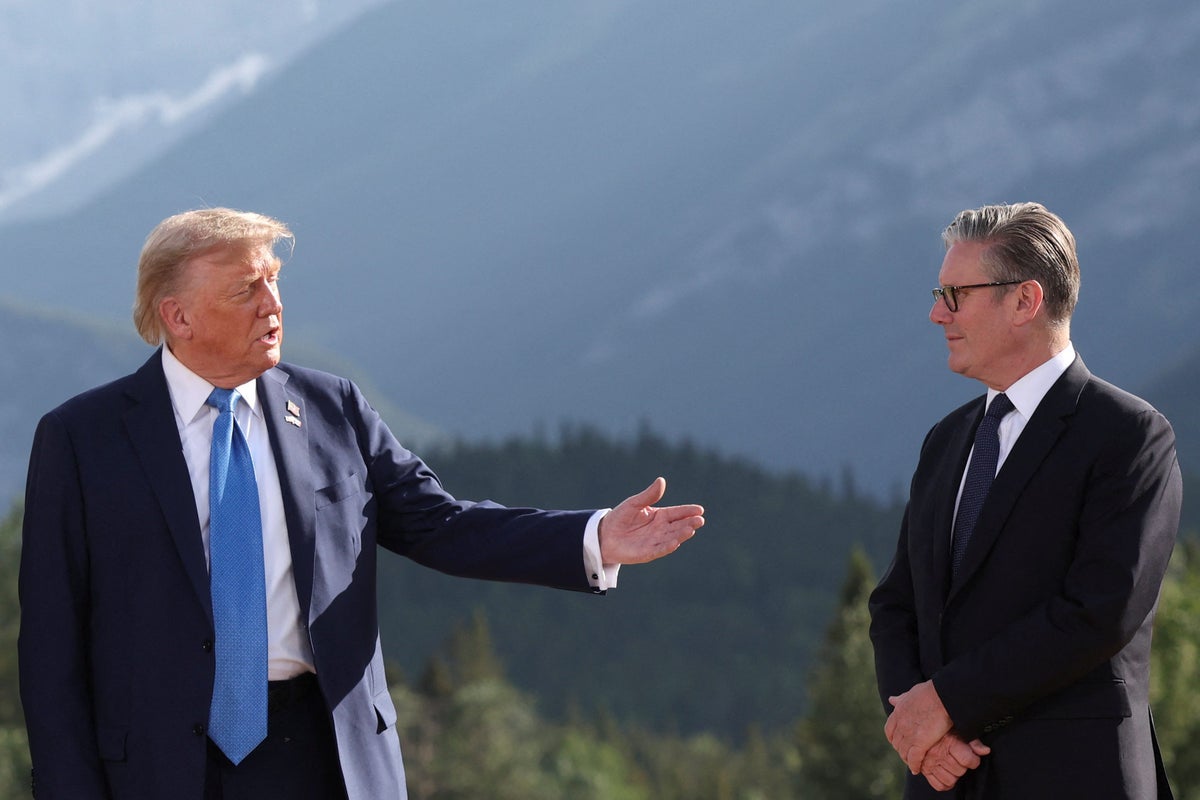Trump’s Iran strike opens the door to a new era of Mideast peace and prosperity








Editorial: With the stakes so high now in the tinderbox of the Middle East, Keir Starmer must show the caution that has served him so well on the world stage

© AFP/Getty
The US president has chosen war at Israel’s behest. He may imagine he has scored an easy win, but the world is likely to pay a steep price
Donald Trump was predictably quick to claim victory following the illegal US strike on Iran’s nuclear facilities: “Completely and totally obliterated,” he crowed. Benjamin Netanyahu in Israel and sycophants at home rushed to fawn over his “courageous” and “brilliant” decision. The most senior US military official, Dan Caine, offered a more muted assessment: it was “way too early” to know the full outcome despite severe damage. We cannot yet know whether the blow has ended Iran’s nuclear aspirations – or will spur it to pursue the bomb. It may be weeks or months, too, before Iranian retaliation plays out, with all its potential repercussions.
Two nuclear-armed states have gone to war on the unevidenced claim that a third state is on the verge of acquiring its own nuclear arms. In March, the US director of national intelligence, Tulsi Gabbard, said Iran was not building weapons (though she has now scrambled to align with Mr Trump). Israel is clear that its attacks will continue, and has increasingly talked of regime change. The price is being paid not only by a reviled regime but by the Iranian people.
Continue reading...
© Photograph: Abedin Taherkenareh/EPA

© Photograph: Abedin Taherkenareh/EPA
Britain faces rising climate threats, yet lacks a country adaptation plan. Urgent, coordinated investment is needed to protect lives and infrastructure
Britain’s four-day heatwave – made 100 times more likely by the climate crisis – is expected to claim about 600 lives. Researchers say high temperatures from Thursday to Sunday would lead to a sharp rise in excess mortality, especially among older people in cities such as London and Birmingham. They forecast the deadliest day as Saturday, with temperatures above 32C and about 266 deaths. These are not abstract figures, but lives cut short by a threat we understand, yet remain unprepared for.
Young people seem to grasp this. In a YouGov poll last week, roughly a quarter of 18- to 24-year-olds said they hoped there wouldn’t be a heatwave – while more than two-fifths of older people welcomed the sunshine. That generational split isn’t just cultural. It reflects an entirely rational anxiety: younger people face a future living in a climate emergency. The generation that caused and benefited from the conditions driving global heating will be gone long before the worst costs – financial, environmental, social – have to be paid.
Continue reading...
© Photograph: Maureen McLean/REX/Shutterstock

© Photograph: Maureen McLean/REX/Shutterstock







Editorial: There are thousands of people in prison in Britain with no release date, serving sentences that were abolished in 2012

© Getty
A cinematic immersive experience and stampeding animal puppets are bringing the climate emergency into the city
As parts of the UK swelter, this week brought yet more alarming reports of increasing temperatures, extreme weather events and dwindling chances of meeting the global 1.5C target. It was the UK’s warmest spring on record and its driest in more than 50 years.
Communicating the urgency of our predicament without provoking despair and hopelessness is an intractable challenge, especially when it comes to children. But two trail-blazing theatre experiences are bringing the breakdown of the natural world into urban metropolises, and raising the alarm with such immediacy that even those of us fortunate enough to live in places that have so far been relatively unaffected by the climate crisis must pay attention.
Continue reading...
© Photograph: Tony-san/Ayuntamiento de San Fernando

© Photograph: Tony-san/Ayuntamiento de San Fernando
The House of Commons decision to pass Kim Leadbeater’s Terminally Ill Adults (End of Life) bill marks a historic step towards giving people the right to make fundamental decisions about their own lives – as well as how to end them

© AFP/Getty
Editorial: Should the US decide to join the Israeli attacks on Iran, there are strong moral and practical reasons why Britain should refuse to help its closest ally and stand aside

© PA
The US president promised to keep his country out of conflicts. The Israeli prime minister has other ideas
The maxim that wars are easy to start and hard to end does not appear to be troubling Benjamin Netanyahu. For the Israeli prime minister, conflict is an end as much as a means, extending his political survival. Under international pressure – however belated and insufficient – over the slaughter in Gaza, he launched the attack on Iran. Initially presented as essential to prevent Tehran from the imminent acquisition of a nuclear bomb, a claim running counter to US intelligence, it is increasingly discussed as the path to bringing down the regime. The defence minister, Israel Katz, has said that Iran’s supreme leader, Ayatollah Ali Khamenei, “can no longer be allowed to exist”.
Donald Trump has generally seen armed conflict as a trap rather than an escape route. He said that the US would “measure our success not only by the battles we win but also by the wars that we end – and perhaps most importantly, the wars we never get into”. Yet his failure to achieve the Nobel-worthy peace deals he wants, and Mr Netanyahu’s manoeuvring, appear to have made him keener on US intervention. Israel wants US bunker-busters to attack the underground nuclear facility at Fordow. There is no guarantee that those would succeed. Israel’s regime-ending aspirations further undermine its claim to offer what might be called, in the term infamously used of the 2003 invasion of Iraq, a cakewalk. There isn’t a bad plan for the day after; there is no plan.
Continue reading...
© Photograph: Marc Israel Sellem/UPI/Shutterstock

© Photograph: Marc Israel Sellem/UPI/Shutterstock
Kim Leadbeater has led a strong campaign, but concerns about the likely impact on vulnerable people remain
The central issue before MPs, as they decide how to vote on the latest version of Kim Leadbeater’s assisted dying bill, is how to value individual autonomy relative to collective responsibility for vulnerable members of society when making regulations around the end of life. Should terminally ill people be allowed to end their lives with medical help? If so, under what safeguards? The question remains ethically, medically and legally complex.
Technological and social changes enabling people to live much longer have created challenges around the resourcing of care and experiences of ageing and dying. There are profound questions about how we manage the final stages of life – and what we owe to those living through them.
Continue reading...
© Photograph: Jaimi Joy/Reuters

© Photograph: Jaimi Joy/Reuters
Editorial: No stranger to oversight errors, the Nursing and Midwifery Council has now been revealed to have allowed hundreds of underqualified or fraudulently qualified nurses to work in Britain. Wes Streeting should now draft in his predecessor to assist in rooting them out

© PA
Editorial: The more nations and groups become involved in the growing conflict between Iran and Israel, the more unpredictable events will turn – and the harder for Donald Trump’s America to control them. That’s very much ‘big stuff’ – with big risks

© PA
Editorial: The government’s decision to launch a full statutory inquiry into historic grooming cases is long overdue. Thousands of girls were failed not only by their abusers but by the very institutions and individuals meant to protect them. At last, a national reckoning is underway

© House of Commons
Editorial: The G7, and parliament, must bring cool heads to bear for the clarity necessary to decide what action must be taken to moderate the conflict between Iran and Israel

© AFP/Getty
Editorial: There is one G7 leader who has a different view of the world – can the other six find common ground with Donald Trump?

© PA
Editorial: As the drumbeat of war in the Middle East becomes more insistent after Netanyahu’s pre-dawn strikes on Tehran’s nuclear sites, it is time for Trump to get angry, for all the right reasons, with the right man

© WANA
Editorial: In spite of Rachel Reeves’s much-vaunted increase in MoD expenditure, a rise to 2.6 per cent of GDP can only be achieved by draining the overseas aid budget, reallocating intelligence agency funds, and other sleights of hand. When the prime minister faces Nato leaders, including Donald Trump, he will have no choice but to spin the numbers

© PA
Editorial: With the Brexit reset, new trade deals and planning reforms, the chancellor’s spending review could result in a stronger economy with a better long-term growth rate. But it will take time

© House of Commons
Editorial: The authority of the chancellor has been badly compromised by the missteps she’s taken in her first year in office – unforced errors compounded by poor presentation

© PA
Editorial: The chancellor has to balance the competing demands of ministers in her spending review but must make sure she keeps Britain’s finances on a secure footing

© PA